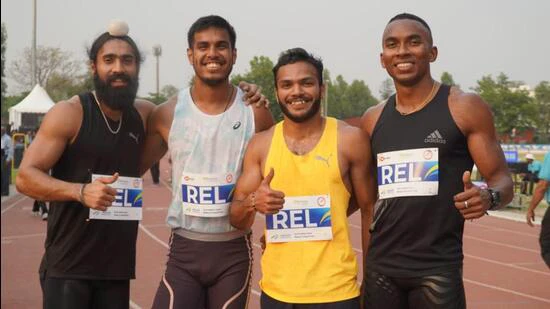New Delhi: In a landmark domestic feat, four of India’s fastest sprinters recently shattered the men’s 4x100m national record, which had stood unbroken for 15 years.
Gurindervir Singh, Animesh Kujur, Amlan Borgohain, and Manikanta Hoblidhar clocked a blistering 38.69 seconds at the India Open Relays, sending ripples through the Indian athletics circuit. All four represented the Reliance Foundation Youth Sports (RSF) in Chandigarh, and the new national record now stands in the name of RSF.
The feat, though, wasn’t just about raw speed; it also symbolised a shift in Indian athletics. For the first time, the Athletics Federation of India (AFI) has opened domestic competitions to private sports organisations, allowing entities like RSF and JSW Sports to field their own teams.
RSF is the non-profit arm of Reliance Industries, and JSW Sports is backed by the steel giants. They train their athletes at respective elite state-of-the-art high-performance centres.
Domestic meets this season have seen participation from state associations, public sector units, corporate-backed foundations, and even Sports Authority of India’s NCOE centres (Indian Relays meet) – making for a diverse and competitive structure. The new model could significantly reshape the landscape of Indian athletics.
The AFI leadership believes it will not only elevate the level of competition but also compel states to upgrade their facilities and increase support for their athletes.
“We wanted to try something different this Olympic cycle,” says AFI spokesperson and former president Adille Sumariwalla. “Athletes can now train wherever they choose and compete in domestic events. This should also motivate states to step up. Tamil Nadu, for instance, already has a foreign coach. Other states might follow suit.”
This change comes in the wake of India’s underwhelming performance at the Paris Olympics, where only Neeraj Chopra managed to shine, winning a second consecutive Olympic medal. The rest of the contingent largely disappointed.
In the changing scenario, RSF athletes have broken three national records – 100m, 200m, and the 4x100m relay. Gurindervir Singh clocked 10.20s to set a new 100m record, Animesh Kujur smashed the 200m mark with 20.40s, and the quartet of Gurindervir, Animesh, Amlan, and Manikanta combined for the relay record.
These achievements come after years of planning at RSF’s high-performance centres in Odisha, and now in Mumbai, focussed on sprinters. James Hillier, RSF’s athletics director, has played a key role. Hillier has been preparing elite athletes at RSF since 2019 and has worked closely with Indian athletics.
“A lot of planning and effort has gone into this. It’s exciting times for Indian sprinting. Back in 2019, a 10.5s sprint could win you the 100m. Now, 10.45s may not get you to the final. That’s significant progress in five to six years,” Hillier told HT.
The ripple effect is being felt across the circuit. “Even athletes whom we don’t coach have started pushing the boundaries. There’s a belief that ‘yes, we can run 10.2s.’ That mindset didn’t exist before.”
At the Federation Cup, Pranav Pramod Gurav of Railways won the 100m in 10.27s, with Animesh (10.32s) and Manikanta (10.35s) close behind. The momentum carried into the UAE Grand Prix, where the men’s 4x100m team clocked 38.76s to set a new meet record. Animesh continued his stellar run, timing 20.45s in the 200m.
It’s an encouraging build-up to the Asian Championships in South Korea later this month, where Indian sprinters are eyeing a podium finish. Given their form, all four sprinters from RSF are part of India’s relay team, and Hillier has been appointed to lead the squad.
“I’m really excited about the opportunity,” Hillier. “Opening up domestic competitions was a smart move by AFI. At Reliance, our mission is to prepare athletes to win medals for the country.”
Hillier has also been credited with backing talents like Jyothi Yarraji, who has risen to prominence and clinched a silver medal in the 100m hurdles at the Asian Games.
“There’s no shortage of talent in India, but it hasn’t always been developed properly. A huge part is mental. Many athletes grow up believing they’re not good enough. We’ve challenged that mindset and changed it through our training programme.”
RSF’s elite training centre in Mumbai, led by Hillier, combines state-of-the-art equipment with a holistic development philosophy. “It’s an integrated approach focused on continuous improvement,” he says.
However, Hillier, with his experience of working in India, feels grassroots need to be developed. Though his focus is elite performance, Hillier emphasises that a strong foundation is vital. “I’m not a grassroots coach. I work at the high-performance level. In the longer run for Indian athletics, the base needs to be much stronger.”
“You need specialist coaches in each area. I find the best coaches here want to work with elite athletes. Also, coaches should not be holding on to athletes, I know there are rewards and awards that come with it but that’s dangerous.
“Everyone is chasing short-term results. At ages 12 or 13, the focus should be on fundamentals, like teaching proper technique, discipline, mental preparation, and competition readiness — not just winning medals. If you teach these things correctly, it would not require fixing such problems at the elite level.”
